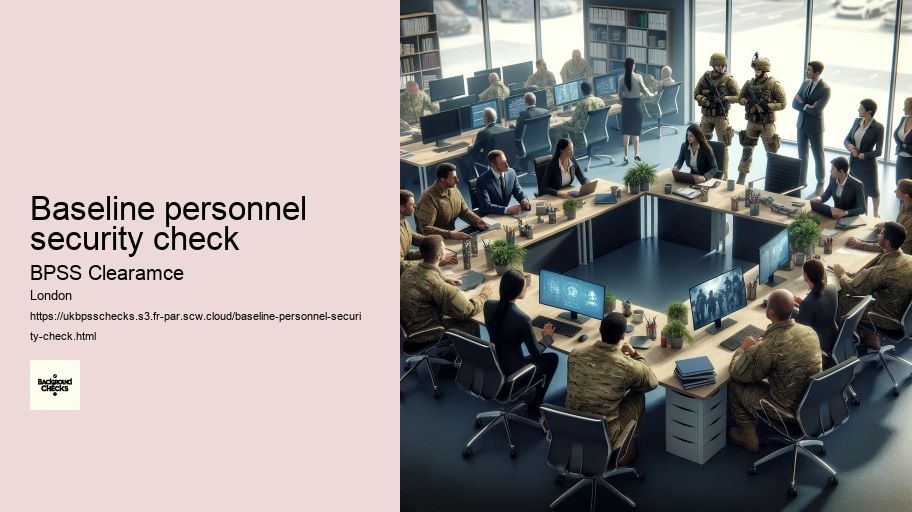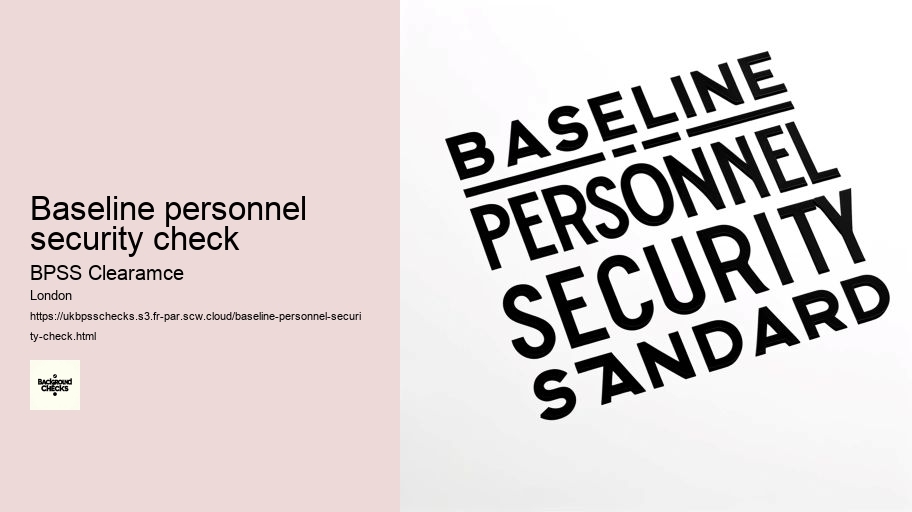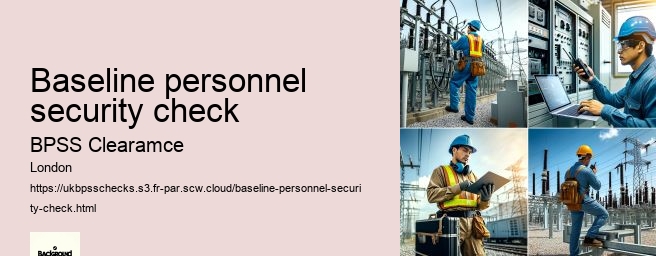
How Much Does a BPSS Check Cost? When looking into the cost of a BPSS check, you'll find that it can vary based on the service provider and the specific checks needed.
What Is in a BPSS Check? When you undergo a BPSS check, various screenings are conducted to confirm your trustworthiness and eligibility for accessing sensitive information. These checks typically include Basic DBS Check, ID Check, Right to Work check, and 3-Year Employment History Check.
A crucial part of the BPSS clearance is the criminal record check, which helps identify any unspent convictions the applicant may have. This information is critical in assessing whether an individual might pose a risk to national security or the safety of the public. By ensuring that employees do not have harmful criminal backgrounds, organizations can maintain a safe and secure working environment.
Maintain your BPSS clearance by understanding the validity period and renewal requirements. Your BPSS clearance is typically valid for 3 years from the date of issue. To continue accessing government assets, renewal of your BPSS clearance is necessary after this 3-year period. Some organizations may stipulate more frequent renewals based on their internal policies.
Under the Immigration, Asylum, and Nationality Act 2006, employers are required to perform right to work checks to confirm an individual's eligibility to work in the UK. BPSS clearance incorporates these checks, aligning with legal requirements to prevent illegal working and ensuring that all employees have the necessary authorization to work.
4. **Confirm Employment History:** Validate the accuracy of the individual's employment history to ensure transparency and honesty.

Digital technology also enhances the accuracy of the BPSS checks by reducing human error. Automated systems can cross-reference and validate information against multiple databases in real-time, ensuring that discrepancies are quickly identified and addressed. This leads to a more reliable vetting process and increases the security and trustworthiness of personnel.
Baseline Personnel Security Standard (BPSS) checks are a fundamental pre-employment screening process in the United Kingdom, primarily designed for individuals who will be working in the government or with government contractors.
If you're a non-UK national, make sure you provide proof of residency along with other required documentation. Additionally, be prepared to submit detailed employment history records like payslips and tax documents to validate at least three years of work experience.
Social workers dealing with sensitive cases, such as child protection or mental health issues, need BPSS clearance to ensure they handle such vulnerable information with the utmost integrity and confidentiality.
2. **Conduct Identity Check:** Authenticate the person's identity through official documents like passports or driver's licenses.
BPSS checks are generally conducted as a one-time check prior to employment to establish a baseline of trust and security clearance. However, depending on the nature of the work and the level of security required, BPSS checks might be revisited if a person's role or security clearance level changes.


Compliance with BPSS checks is not only about adhering to legal requirements but also about ensuring the safety and security of governmental operations and sensitive information.
The verification of essential documents plays a pivotal role in the recruitment process requirements for obtaining BPSS clearance. To guarantee a thorough evaluation of candidates, organizations typically follow these steps:Applicants need to provide documents like a passport or driver's license to confirm their identity.
Providing evidence of volunteering activities or caring responsibilities could form part of the supplementary checks during BPSS clearance. Additionally, documentation related to career gaps, redundancy, or periods of unemployment may be requested to ensure a thorough review of the individual's background.
If you have been self-employed, invoices to clients and bank statements showing payments received can serve as evidence. Additionally, when applying for BPSS clearance, it's crucial to have your P45 and P60 forms available as they're key documents that prove your employment history.
To initiate the process of conducting a BPSS check, start by gathering all necessary documentation and information for the screening requirements. Follow these steps to guarantee a thorough BPSS clearance:
Civil servants in various departments, especially those dealing with defense, foreign affairs, and treasury, need BPSS clearance. Their roles potentially expose them to sensitive information that could affect the country’s governance and international standing.

Military personnel, from soldiers to strategists, also require BPSS clearance due to their access to classified military operations and strategic information. The clearance is essential to safeguard national security and operational integrity within the armed forces.
For compliance, it is vital that employers keep records of the documents checked as part of the right to work process. These records must be stored securely and retained for the duration of the employee's employment and for two years afterwards, as stipulated by the Home Office. This documentation can be critical in proving that the employer has diligently followed legal requirements should their compliance ever be questioned.
Enhanced technological advancements are shaping the future landscape of BPSS compliance, offering quicker and more accurate identity verification processes. As the industry evolves, here are some key aspects to ponder:
BPSS stands for "Baseline Personnel Security Standard." It's essentially a basic level of security clearance required for individuals working in roles that involve access to sensitive information or facilities, especially in the public sector. The BPSS checks typically include identity verification, employment history checks, and criminal record checks.
No, BPSS (Baseline Personnel Security Standard) and DBS (Disclosure and Barring Service) are not the same.
BPSS (Baseline Personnel Security Standard): This is a set of government guidelines in the United Kingdom for ensuring the security clearance of individuals working with sensitive information or in certain roles. It is a basic level of security clearance and involves checks such as identity verification, employment history, and criminal record checks. BPSS is often required for roles in both the public and private sectors where access to sensitive information or facilities is involved.
DBS (Disclosure and Barring Service): This is a government agency in the UK that performs checks on individuals working with children or vulnerable adults. The DBS conducts criminal record checks (previously known as CRB checks) to help organizations make safer recruitment decisions by identifying candidates who may be unsuitable for certain roles due to past criminal convictions, cautions, reprimands, or warnings.
While both BPSS and DBS involve background checks, they serve different purposes and are used in different contexts. BPSS focuses on security clearance for a broader range of roles, including those involving access to sensitive information, while DBS specifically focuses on roles involving work with vulnerable groups.
The Baseline Personnel Security Standard (BPSS) checks typically include:
Identity Verification: Verifying the identity of the individual through official documents such as passports, driver's licenses, or other government-issued identification.
Employment History Checks: Verifying the individual's employment history to ensure accuracy and assess their suitability for the role.
Criminal Record Checks: Checking for any criminal convictions or cautions. This is often done through a Basic Disclosure from the Disclosure and Barring Service (DBS) in England and Wales, Disclosure Scotland in Scotland, or AccessNI in Northern Ireland.
Verification of Address: Verifying the individual's current and previous addresses to ensure accuracy and completeness of their background information.
These checks are aimed at establishing a baseline level of trustworthiness and suitability for individuals working in roles that require access to sensitive information or facilities, particularly within the public sector but also in some private sector positions.
A valid proof of address for a Baseline Personnel Security Standard (BPSS) check typically includes official documents that clearly display the individual's name and current address. Common examples of acceptable proof of address documents may include:
Utility Bills: Recent bills for services such as electricity, gas, water, or landline phone, issued within the last three to six months.
Bank Statements: Recent bank statements, typically issued within the last three to six months, showing the individual's name and address.
Official Letters: Letters from government agencies, local authorities, or financial institutions, such as tax statements, council tax bills, or letters from the Department for Work and Pensions (DWP), which display the individual's name and address.
Tenancy Agreements: A signed and dated rental or lease agreement for accommodation, showing both the tenant's and landlord's details, along with the property address.
Mortgage Statements: Statements from a mortgage provider showing the individual's name and property address, issued within the last three to six months.
It's important to note that the specific requirements for proof of address may vary depending on the organization conducting the BPSS check. Additionally, the document should be recent and not expired, and it should clearly display both the individual's name and current address.
A Baseline Personnel Security Standard (BPSS) check is typically required for individuals working in roles that involve access to sensitive information or facilities, particularly within the public sector but also in some private sector positions. While specific requirements may vary depending on the organization and the nature of the role, BPSS checks are commonly needed for individuals who:
In summary, individuals who require a BPSS check are those whose roles involve a level of trust, responsibility, and access to information or facilities that necessitate verification of their identity, employment history, and suitability for the position.
The Baseline Personnel Security Standard (BPSS) does not have an expiry date like some other security clearances. Instead, it serves as a foundational level of security clearance that establishes an individual's baseline trustworthiness and suitability for roles requiring access to sensitive information or facilities.
However, while the BPSS itself does not expire, organizations may have their own policies regarding the periodic review or renewal of security clearances for their employees. For instance, some employers may require employees to undergo regular rechecks or refreshes of their background checks, including BPSS checks, to ensure that their security clearance remains up to date.
Therefore, although the BPSS clearance itself doesn't have a fixed duration, individuals and organizations should be aware of any policies or requirements related to maintaining and updating security clearances in accordance with best practices and organizational guidelines.